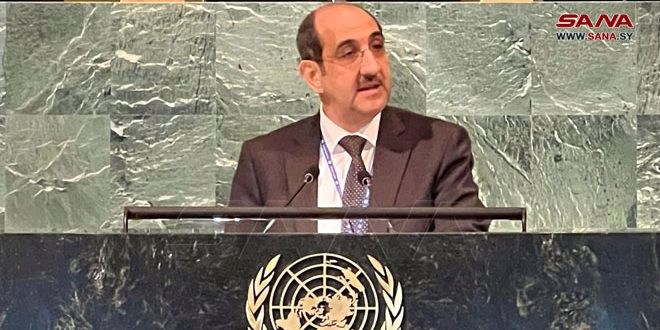Ambassador Sabbagh: Hostile approach of Western countries towards Ukrainian crisis is evidence of their efforts to fuel war and Nazi tendency
Syria’s permanent representative to the United Nations, Ambassador Bassam Sabbagh, affirmed that the continued hostile and provocative approach of some Western countries towards the Ukrainian crisis is clear evidence of these countries’ efforts to fuel the war and neo-Nazi tendency in Ukraine, noting that the draft resolution presented by these countries before the General Assembly is more hostile towards Russia, and came after its failure to pass in Security Council.
In Syria’s statement on Wednesday, during the resumption of the emergency session of the General Assembly on the situation in Ukraine, Sabbagh said: Some western countries exploited the forum of the United Nations General Assembly to serve their geopolitical interests, which in turn would deepen the state of polarization among the member states of the United Nations. Those countries requested the resumption of this emergency special session, and submitted a draft resolution before the General Assembly, which is more hostile towards Russia, after its failure to pass in the Security Council.
Sabbagh pointed out that the proposed draft resolution, which member states did not have the opportunity to study or make any amendments to, is clear evidence that these countries have no interest other than passing hostile political positions towards Russia.
Sabbagh expressed Syria’s condemnation of the coordinated campaign launched by Western countries against Russia, by publishing misleading information, false accusations, and fabricated photos and videos aimed at undermining Russia’s natural right to ward off threats to the security of its people, as guaranteed by the Charter of the United Nations.
Sabbagh pointed out that the Charter of the United Nations, which its founders wrote 75 years ago in good faith, has been exploited over the past years in a wrong selective manner, using double standards in its application. The countries that wage their hostile campaign against Russia today and criticize its defense of its security and borders, are the same countries which launched barbaric acts of aggression against Syria under the pretext of “defending its national security,” even though it is thousands of miles away. The United States and the countries affiliated with the so-called “international coalition” destroyed entire cities and killed thousands of their residents, as was the case for the city of Raqqa, and therefore these countries are not entitled to shed tears or give lessons and sermons, because they lack credibility.
Syria’s permanent representative to the United Nations pointed out that after the dissolution of the Soviet Union republics, Russia recognized the CIS ( Commonwealth of Independent States) and supported its partners, including Ukraine. The Kiev authorities had to respect the facts of history and geography, and refrain from any retaliatory measures or practices against the Russians residing in Donbass, and against the people of the two popular republics of Lugansk and Donetsk, and to adhere to the principles of neutrality and good-neighborliness. However , the Ukrainian governments after the coup in 2014 adopted negative and dangerous policies towards Russia based on denying everything that unites the two countries’ people. The political leaders and extremist parties in Ukraine tried with Western support distorting the consciousness and historical memory of the Ukrainian people.Extremist movements took advantage of this situation to escalate the hostile situation against Russia.
Sabbagh pointed out that NATO countries played the role of the instigator who tempted extremist groups in Ukraine with promises to join the alliance and the European Union, and to obtain aid and military protection, in exchange for raising the level of hostility and threat against Russia.
Sabbagh praised Russia’s efforts to achieve stability and ensure the safety and security of the Russian and Ukrainian people, hosting hundreds of thousands of refugees, ensuring the delivery of humanitarian aid, providing safe passages for civilians, and agreeing on the passage of grain and food shipments.
Sabbagh noted that Syria voted against Albania’s proposal regarding the method of voting on the proposed draft resolution, that it should not take place through a secret ballot, not because it is against transparency in the work of the General Assembly, but rather due to its awareness of the extent of embarrassment and the great pressure exerted by Western countries on Member States, to pass this unbalanced and hostile resolution against Russia. He stressed Syria’s rejection of this approach, and its call on other countries to be aware of the dangers of being drawn into it, and the need to reject efforts to practice isolation, hostility, and double-standard policies.
Inas Abdulkareem

